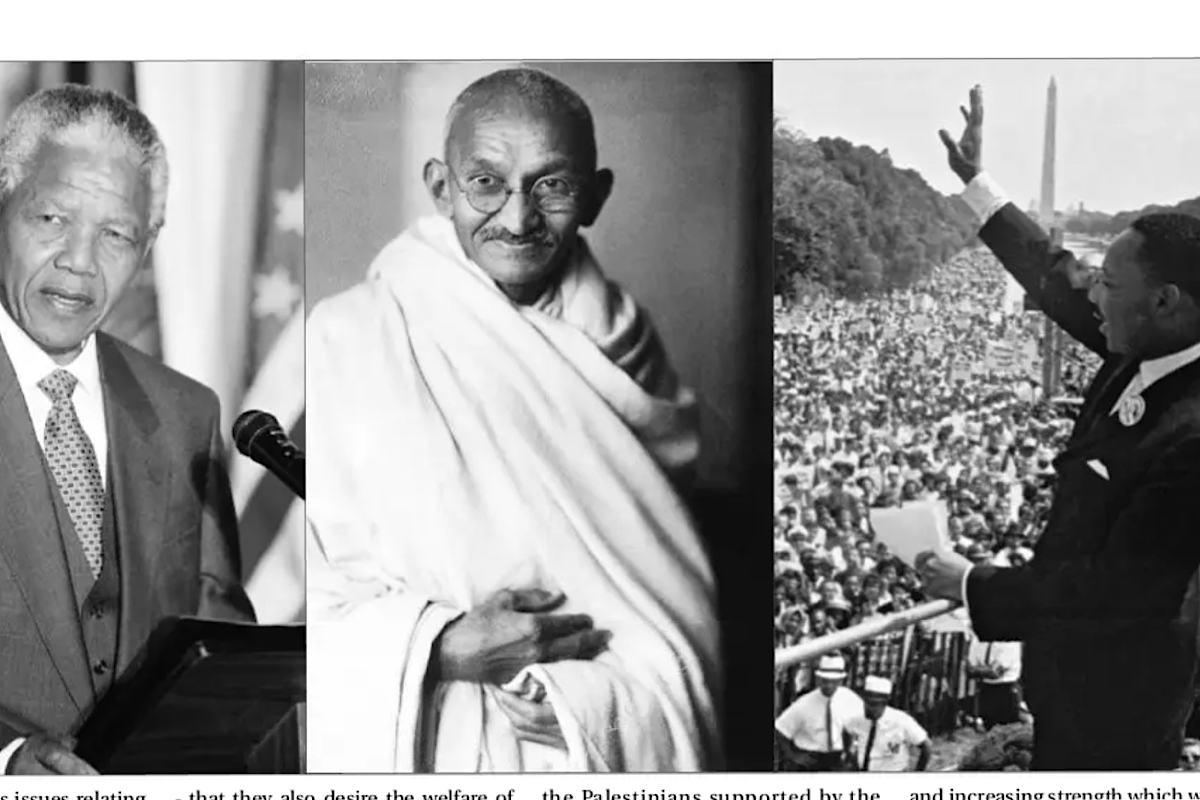Israeli army kills 4 Palestinians across Gaza
The Israeli army killed at least four Palestinians across the Gaza Strip on Sunday, according to Palestinian health authorities and medical sources.
Apath of non-violent struggle can often be the best forward when the cause is deeply rooted in justice and there is widespread recognition of this being so.

Representation image
Apath of non-violent struggle can often be the best forward when the cause is deeply rooted in justice and there is widespread recognition of this being so. The Palestinian cause can be described, within the framework of the two-state solution, as the yearning of the Palestinian people for a state of their own for achieving a life of peace, dignity and justice without being hampered by others.
Framed in this way, without any threat to Israel or anyone else, the Palestinian cause can get widespread support in the international community, as well as overwhelming support among all those people who stand for peace and justice. While the support of the Arab countries may be the strongest, in addition there will be support also from distant places. Such causes are best pursued in non-violent, open and transparent ways, not in violent and secretive ways.
Advertisement
Truth is on their side, justice is on their side, reason is on their side. Hence open movements which are pursued in non-violent ways with continuity and can be sustained for a long enough time are the most suited in such conditions. If in the process people can acquire a much deeper and wider commitment to non-violence, this will be even better for the future of the people and their country. Mahatma Gandhi, Martin Luther King Jr. and Nelson Mandela are only some of the great persons of the previous century who showed the way ahead with their non-violent struggles, whether in the form of civil disobedience or peaceful mass protest movements or in other ways.
Advertisement
Their inspiring struggles should not be seen as merely a part of history but instead should inspire many more non-violent struggles in this century, whether for the cause of democracy, or environment protection, or for a life based on justice and dignity. The struggle of the Palestinian people involves all these components, as issues relating to water, farming, fishing, livelihoods, and the growing problems relating to all of these in times of climate change are also involved. In fact, the region is very vulnerable to climate change-related problems with its coastal areas, deserts and water scarcity. Hence if a two-state solution can be worked out peacefully then both Palestine and Israel will be freed from the burden of excessive militarization and will also be able to cooperate with each other for resolving the new problems arising from climate change.
Imagine a scene in which the struggle instead of being led by the battle cries of the likes of Hamas is instead led by peaceful processions of Palestinians who declare openly and loudly – their voice amplified by increasingly sympathetic world media – that they also desire the welfare of all people of Israel and their only yearning and struggle is for a state of their own where they can live with peace and dignity. While it is likely that such a struggle will get the support of most countries as well as the UN, at the same time efforts can be made to make the change more acceptable to Israel by, for instance, several Western countries arranging a finance package to ensure that the settlers in the West Bank can return home to Israel in acceptable conditions without burdening the Israeli economy. At the same time, of course, the international community should also arrange substantial relief for all those Palestinians who have been victimized and deprived in such horrible ways.
Hence a non-violent struggle of the Palestinians supported by the international community in such a way that the hostility of Israel is steadily reduced can give good results within a relatively short period of time and can provide a very inspirational chapter for the 21st century. It must be realized that when the weaker and wronged side is preparing for a non-violent struggle, it is important also to work on the stronger adversary to increase the chances of an early settlement and to minimize the chances of any repressive actions. Hence the role of the international community, the United Nations, and of the peace movement in various parts of the world will be very important for ensuring a happy ending for such a non-violent struggle.
In the process of making such an effort, the peace movements in various parts of the world can achieve greater unity and increasing strength which will be useful for other peace initiatives as well. Reputed diplomats can also help in this. In the present conditions, however, so much serious harm has been caused to the people of Gaza that any hope in the distressing situation can be brought about first and foremost only by a ceasefire followed by a big rehabilitation effort.
This is the biggest need for these times. After this as the post-war situation is sought to be stabilized in a peaceful way, the path of non-violence should get much more importance in any efforts that are taken up to achieve a two-state solution and other justified demands of the Palestinians.
(The writer is Honorary Convener, Campaign to Save Earth Now. His recent books include Planet in Peril, Protecting Earth for Children and A Day in 2071.)
Advertisement